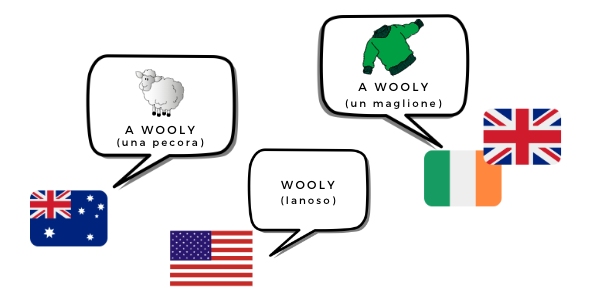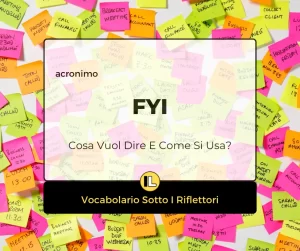Questo blog post esplora le cose che rendono l’apprendimento così difficile quando si tratta della lingua inglese. Ci sono intoppi numerosi e meglio capirli così che tu possa superarli.
Lista di vocaboli
- Notorious: che ha una pessima reputazione; famigerato.
- Mastery: conoscenza perfetta di una materia; padronanza.
- Next to impossible: quasi impossibile.
- It’s a given: è ovvio; è un dato di fatto.
- To give (someone) an edge: dare una marcia in più a qualcuno.
- A head start: una marcia in più.
- A walk in the park: una cosa facilissima.
- To take (something) for granted: dare qualcosa per scontato.
- FYI: for your information; per la tua informazione.
- HH: happy hour/ aperitivo.
- LMK: let me know/fammi sapere.
- ‘cause/cuz: because (slang)/ perché.
- ASAP: as soon as possible/ il più presto possibile.
- TTYL: Talk to you later! Ci parliamo più tardi.
Ascolta la Registrazione
The English language is notorious for being difficult to learn. From its complex spelling rules to its inconsistent pronunciation patterns, you could say that complete mastery of the language is a next to impossible. Of course, complete mastery is not needed in order for you to work, study and thrive in English speaking countries, but the better your English is, the more opportunities you will have.
It’s a given that Italians speak much better English than English speakers (especially Americans) speak Italian. Why? Because Italians start studying foreign languages in school much earlier than we do in the US. According to the Pew Research Center, 82 percent of Italian primary and secondary students learn a foreign language, while only 20 percent of American students do. This early exposure to foreign languages definitely gives Italians an edge when it comes to learning English!
Even when considering the head start that Italians have with languages, learning English is not a walk in the park. Let’s take a closer look at some of the reasons why.
#1 English Pronunciation and spelling don't always make sense.
La pronuncia e l'ortografia inglesi spesso non hanno senso.
Ad esempio (tutti gli Esempi sono in AmE):


Cell /sɛl/
His tiny room felt like a jail cell.
Cello /ˈtʃɛloʊ/
I’m learning to play the cello.


Wind /wɪnd/
There was a strong gust of wind.
Wind /wīnd/
Please wind up that rope before someone trips on it.
Break rhymes with bake, but strangely not with wreak!
Break /breɪk/
Let’s take a break.
Wreak /rik/
Laying out in the sun too long will wreak havoc on your skin.

Silent letters really complicate things too! For example, salmon is pronounced without the “L” sound.
Salmon /ˈsæmən/
The salmon are swimming upstream.

….And numb is pronounced without the b sound.
Numb /nʌm/
It’s so cold out, my hands have gone numb!
#2 English has a lot of Homophones.
L'inglese ha Tanti Omofoni.
Homophones are words that sound exactly like each other, but they have different meanings. They’re not very fun for English learners!
For example:



#3 Terms and slang can be different depending on which English speaking country you're in.
I termini e Slang possono essere diversi a seconda del Paese anglofono in cui ti trovi.



#4 We do a lot of wacky things with our verbs in English.
Si fanno delle cose strane per quanto riguarda i verbi inglesi.
- To begin iniziare →
- began (pass. rem.)
- begun (part. pass.)
- To forbid proibire →
- forbade (pass. rem.)
- forbidden (part. pass.)
- To creep strisciare→
- crept (pass. rem. / part. pass.)
- To seek cercare→
- sought (pass. rem. / part. pass.)
- To grind macinare→
- ground (pass.rem. / part.pass)…. che è anche un omofono! (terra)
#5 English Speakers love to abbreviate words and use acronyms.
I Madrelingua inglesi amano fare abbreviazioni e acronimi.

There are some acronyms and abbreviations that we can say out loud in conversation, such as FYI and ASAP (or A-S-A-P), but there are others that would sound very strange if you used them in conversation. For example you can write “HH,” for “happy hour” but you would never say “HH” in conversation. The same goes for LMK and TTYL.
Here’s an example of a text message you might get from a friend:
FYI, HH starts at 5pm. LMK if that works for you ’cause/cuz I want to reserve a table ASAP. TTYL!”
Voglio che tu sappia che l’happy hour comincia alle 5. Fammi sapere se va bene questo orario perché vorrei prenotare il più presto possibile. A più tardi!
- FYI: “for your information”/ “FYI”
- HH: “happy hour”
- LMK: “let me know”
- ’cause/cuz: “because”
- ASAP: “as soon as possible” / “ASAP” / “A-S-A-P”
- TTYL: “Talk to you later”
By the way, if you want to learn more acronyms, please sign up for my newsletter because that’s something that I focus quite a bit on.
#6 There are so many regional accents, even within the same English Speaking country.
Ci sono tanti accenti regionali, anche nello stesso Paese.
For example, in some parts of the southern United States, people might pronounce the word police /pəˈlis/ as police /’poʊlis/.
And instead of eating a pecan /pɪˈkɑn/ they might eat a pecan /pɪˈkæn/, or even pecan /ˈpikæn/.

(image edited) TUBS, CC BY-SA 3.0, via Wikimedia Commons.
Let’s look at another part of the country: the city of Boston. People who are born and raised in Boston Massachusetts, might pronounce car /kɑr/ as car /kə/.

(image edited) Astrokey44, CC BY-SA 3.0, via Wikimedia Commons
#7 And Don't get me started on false cognates!
E non se ne parla dei falsi amici!
- Sale = una vendita
- Romance = la storia dell’amore
- Attic = la soffitta
- Brine = acqua salata
- Arrange = disporre
- Attend = assistere
- Patent = brevetto
- Argument = litigo
- Casual = informale
- Stamp = francobollo
- Camera = macchina fotografica
- Affluent = ricco
- Canteen = bottiglia metallica
- And so many more, as you probably know…!

Don't give up! Here are some things that will make you speak English like a pro.
Non demordere! Ecco qui le cose che ti aiuteranno a parlare l'inglese come un vero professionista.
LISTEN TO ENGLISH
- Find a good English Podcast. Podcasts are a great way to get exposure to accents and slang from different countries and regions.
- Also listen to English music. Some musicians sing more clearly than others. (If you want specific suggestions, read my blog post What Kind of Music Should I Listen to if I Want to Learn English? )
- Watch movies and TV shows in English. Try and find the ones in which the characters talk a little slower if you can. I don’t recommend using Italian subtitles because it’s too confusing.
- Watch the videos I post on my You Tube channel too!
WRITE IN ENGLISH
- Get a pen pal.
- Join a facebook group. You can find me on facebook at Inglese Liscio….e anche Instagram 🙂
READ ENGLISH
- Change the language on your search engine to English for a few days and see how much you understand.
- Read my blog posts!
SPEAK ENGLISH
- This may seem silly, but try narrating your actions. For example, when making breakfast, you can say “I’m picking up the soy milk and pouring it into my steaming cup of coffee.” Your roommate will hate you but your English will be so good!
- Find a language buddy online or host an English speaking exchange student.
- Find an English teacher on a site such as italki.com.
KEEP AN ENGLISH VOCABULARY LIST
- A vocabulary list is useless if you don’t practice it regularly. Add your words to a program like Quizlet or Anki so that you can really learn the words and occasionally test yourself on them.
- My blog posts are specifically designed to introduce you to new vocabulary words that you probably haven’t learned as a student, so be sure to sign up for my newsletter!
Feedback is always Welcome
Mi faccio in quattro per rendere questo sito d’aiuto. Quindi, se hai qualsiasi feedback o se vuoi che io scriva su un tema o su una parola particolare in inglese, dimmelo nei commenti, oppure sentiti libero di darmi un suggerimento, cliccando qui.
Iscriviti alla newsletter!

Mi raccomando, iscriviti alla newsletter in modo da incoraggiarti a leggere i post per non perdertene neanche uno. Così l’apprendimento diventerà più facile e efficace. Ti prometto di non sommergerti di mail superflue.



